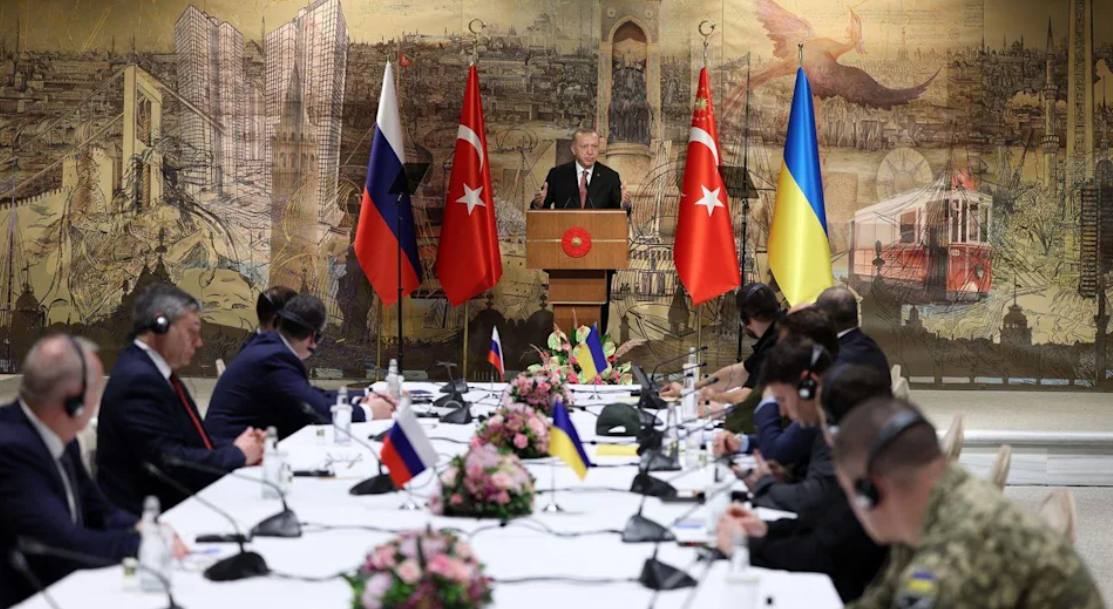Wed Mar 30, 2022
Wednesday / March 30
Russian goals
Russia's defense ministry said Tuesday it would drastically scale back military operations near the Ukrainian capital Kyiv and the northern city of Chernihiv in order to "increase mutual trust" for a potential peace deal with Ukraine. though advances on both cities had already stalled.
Pentagon press secretary John Kirby said the U.S. has seen a "small number" of Russian forces moving away from Kyiv, but stressed that it's "too early" to know whether the pullback will be significant.
"We believe that this is a repositioning, not a real withdrawal, and that we all should be prepared to watch for a major offensive against other areas of Ukraine," Kirby said, pointing in particular to increased Russian activity in the eastern Donbas region.
US sanctions
The United States and its allies plan new sanctions on more sectors of Russia's economy that are critical to sustaining its invasion of Ukraine, including military supply chains, Deputy U.S. Treasury Secretary Wally Adeyemo said on Tuesday.
Adeyemo, speaking in London on a European trip to consult with allies on strengthening and enforcing sanctions to punish Russia, said the broadening of those efforts was aimed at undermining "the Kremlin's ability to operate its war machine."
"In addition to sanctioning companies in sectors that enable the Kremlin's malign activities, we also plan to take actions to disrupt their critical supply chains," Adeyemo told an event at the think tank Chatham House.
US yield
A closely monitored section of the U.S. Treasury yield curve inverted on Tuesday for the first time since September 2019, a reflection of market concerns that the Federal Reserve could tip the economy into recession as it battles soaring inflation.
For a brief moment, the yield on the two-year Treasury note was higher than that of the benchmark 10-year note . That part of the curve is viewed by many as a reliable signal that a recession could come in the next year or two.
The 2-year, 10-year spread briefly fell as low as minus 0.03 of a basis point, before bouncing back above zero to 5 basis points, according to data by Refinitiv.
While the brief inversion in August and early September 2019 was followed by a downturn in 2020, no one foresaw the closure of businesses and economic collapse due to the spread of COVID-19.
Food crisis
The U.N. food chief warned on Tuesday that the war in Ukraine was threatening to devastate the World Food Programme's efforts to feed some 125 million people globally because Ukraine had gone "from the breadbasket of the world to breadlines."
"It's not just decimating dynamically Ukraine and the region, but it will have global context impact beyond anything we've seen since World War Two," WFP Executive Director David Beasley told the 15-member United Nations Security Council.
Beasley said 50% of the grain bought by the WFP, the food-assistance branch of the United Nations, comes from Ukraine, "so you can only assume the devastation that this is going to have on our operations alone."
"The farmers are on the frontlines," he said.
Beasley added that the crisis was compounded by a lack of fertilizer products coming from Belarus and Russia.
Deputy U.S. Secretary of State Wendy Sherman said, “The responsibility for waging war on Ukraine and for the war’s effects on global food security falls solely on President Putin.”
US stocks
U.S. equities futures dipped slightly Tuesday evening after stocks extended their rally in the previous session, even as fears of an inverted yield curve sparked recession concerns and investors continued watching developments play out in Ukraine.
Futures tied to the Dow Jones Industrial Average slipped by 27 points, or 0.08%. S&P 500 futures fell 0.1% and Nasdaq Composite futures lost 0.1%.
In regular trading, the Dow added 338 points, or 0.97%, and the S&P 500 rose 1.23% – both for their fourth straight day of gains. The Nasdaq Composite climbed 1.84%, and now sits less than 10% from its record.
